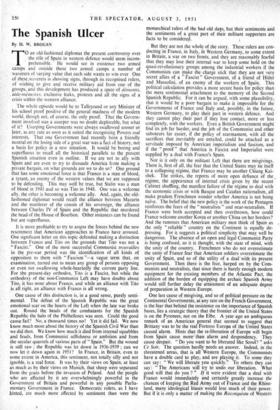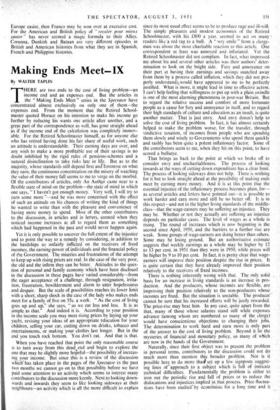The Spanish Ulcer
By D. W. BROGAN
TO an old-fashioned diplomat the present controversy over the role of Spain in western defence would seem incom- prehensible. He would see in existence two armed camps and outside those two armed camps a number of waverers of varying value that each side wants to win over One of these waverers is showing signs, through its recognised rulers, of wishing to give and receive military aid from one of the groups, and this development has produced a spate-of dementis, aide-mernoires, exclusive leaks, protests and all the signs of a crisis within the western alliance.
The whole episode would be to Talleyrand or any Minister of his school proof positive of the general madness of the modern world, though not, of course, the only proof. That the Govern- ment involved was a usurper was no doubt deplorable, but what of it? Usurping Governments were always swallowed sooner or later, at any rate as soon as it suited the recognising Powers real interests. That one Government had recently been a friendly neutral on the losing side of a great war was a fact of history, not a basis for policy in a new situation. It would be boring and superfluous to recall all the historical parallels to the present Spanish situation even in outline. If we are not to ally with Spain and are even to try to dissuade America from making a private bargain, on what grounds are we to do so? One ground that has some emotional force is that Franco is a man of blood, a tyrant, an enemy of the western values that we are supposed to be defending. This may well be true, but Stalin was a man of blood in 1941 and so was Tito in 1948. One was a welcome ally, the other is becoming a welcome ally. And, again, the old- fashioned diplomat would recall the alliance between Mazarin and the murderer of the cousin of his sovereign,' the alliance between Charles IV of Spain and the Republic that murdered the head of the House of Bourbon. Other instances can be found but are superfluous.
It is more profitable to try to assess the forces behind the new resentment that American approaches to Franco have aroused. One significant letter on this topic defended making a distinction between Franco and Tito on The grounds that Tito was not a ." Fascist." One of the most successful Communist trouvailles in the pre-war period was the identification of all. kinds of opposition to them with " Fascism "—a vague term that, on .examination, turned out to mean any group of persons opposing .or even not swallowing whole-heartedly the current party line. For the present-day orthodox, Tito is a Fascist, but while the ,orthodoxy of the non-Communist Left may have doubts about Tito, it has none about Franco, and while an alliance with Tito is all right, an alliance with Franco is all wrong.
. One cause of this distinction is, in a good sense, purely senti- mental. The defeat of the Spanish Republic was the great emotional scar on the hearts of the Left when the late war broke out. Round the heads of the combatants for _the Spanish -Republic the halo of the Phithellenes was seen. Could the good cause fail? No, a thousand times no'! Yet it did fail. We now know much more about the history of the Spanish Civil War than we did then. We know how much it died from internal squabbles and feuds, from Communist selfishness or ambition and from the secular quarrels of various parts of " Spain." But the wound is still raw ; the Republic was let down in 19364939 ; can we now let it down again in 1951? In France, in Britain, even to some extent in America, this sentiment, not totally silly and not ignoble, is a real force. It was by their views on Spain; at least as much as by their views on Munich, that sheep were separated from the goats before the invasion, of Poland. And the people who are affected by it are overwhelmingly powerful in the Government of Britain and powerful in any possible Parlia- mentary Government in France. Democratic rulers, as I have hinted. are much more affected by sentiment than were the monarchical rulers of the bad old days, but their sentiments and the sentiments of a great part of their militant supporters are facts to be considered.
But they are not the whole of the story. These rulers are con- ducting in France, in Italy, ih Western- Germany, to some extent in Britain, a war on two fronts, and they are reasonably fearful that they may lose their internal war to keep some hold on the quasi-revolutionary groups among the industrial workers if the Communists can make the charge stick that they are not very secret allies of a " Fascist " Government, of a friend of Hitler and Mussolini, of an enemy of the workers of Spain. This political calculation provides a more secure basis for policy than the mere sentimental attachment to the memory of. the Second Spanish Republic. For it can be argued, with some plausibility, that it would be a poor bargain to make it impossible for the Governments of France and Italy and, possibly, in the future, Western Germany, to play their part in western defence. And they cannot play their part if they lose contact, more or less completely, with the workers. Even a British Government might find its job far harder, and the job of the Communist and other saboteurs far easier, if the policy of rearmament, with all the sacrifices that inevitably are entailed, could be attacked as a servitude imposed by American imperialism and faseism, and if the " proof " that America is Fascist and Imperialist were supplied by a deal with Franco's Spain.
Nor is it only on the militant Left that there are misgivings. There is, first of all, the fear that the United States may tie itself to a collapsing regime, that Franco may be another Chiang Kai- shek. The strikes, the reports of more open defiance of the regime, the appearance of internal crisis given by the recent Cabinet shuffling, the manifest failure of the regime to deal with the economic crisis or with Basque and Catalan nationalism, all make prudent Frenchmen wonder whether America is not being naive. The belief that the new policy is the work of the Pentagon reinforces the fears of the " neutralists " and near-neutralists. If Franco were both accepted and then overthrown, how could France welcome another Korea or another China on her borders? And the rumours that American military men think of Spain as the only " reliable " country on the Continent is equally de- pressing. For it suggests a political simplicity that may well be dangerous. The absence of an open and legal Communist Party is being confused, so it is thought, with the state of mind, with the unity of the country. Frenchmen who do not overestimate the unity of France fear that American soldiers overestimate the unity of Spain, and so of the utility of a dear with its present Government. Then there is the fear, harped on by the Com- munists and neutralists, that since there is barely enough modern equipment for the existing members of the Atlantic Pact, the addition of the burden of equipping the archaic Spanish Army would still further delay the attainment of an adequate degree of preparation in Western Europe.
One last cause of misgiving, and so of political pressure on the Continental Governments, at any rate on the French Government, is the fear that behind the insistence on the importance of Spanish bases, lies a strategic theory that the frontier of the United States is on the Pyrenees, not on the Elbe. A year ago an ambiguous remark of an American general that seemed to suggest that Brittany was to be the real Fortress Europa of the United States caused alarm. Hints that the re-liberation of Europe will begin from Spain cause more- than alarm and despondency. They cause despair. " Do you want to be liberated like Seoul? " asks Ce Soir. The question hardly needs an answer. Indeed, in-the threatened areas, that is all Western Europe, the Communists have a double card to play, and are playing it. To some they can say : " We will liberate you quickly." To others they can say : The Americans will try to undo our liberation. What good will that do you ? " I f it were evident that a deal with Franco would immediately and certainly greatly increase the chances of keeping the Red Army out of France and the Rhine- land, many ideological biases would lose much of their power. But if it is only a matter of making the Reconquista of Western Europe easier, then Franco may be won over at excessive cost. For the American and British policy of " reculer pour mieux sauter" has never seemed a magic formula to their Allies. Corunna, Dunkirk and Bataan are very different episodes in British and American biitories from what they are in Spanish, French and Philippine histories.































 Previous page
Previous page